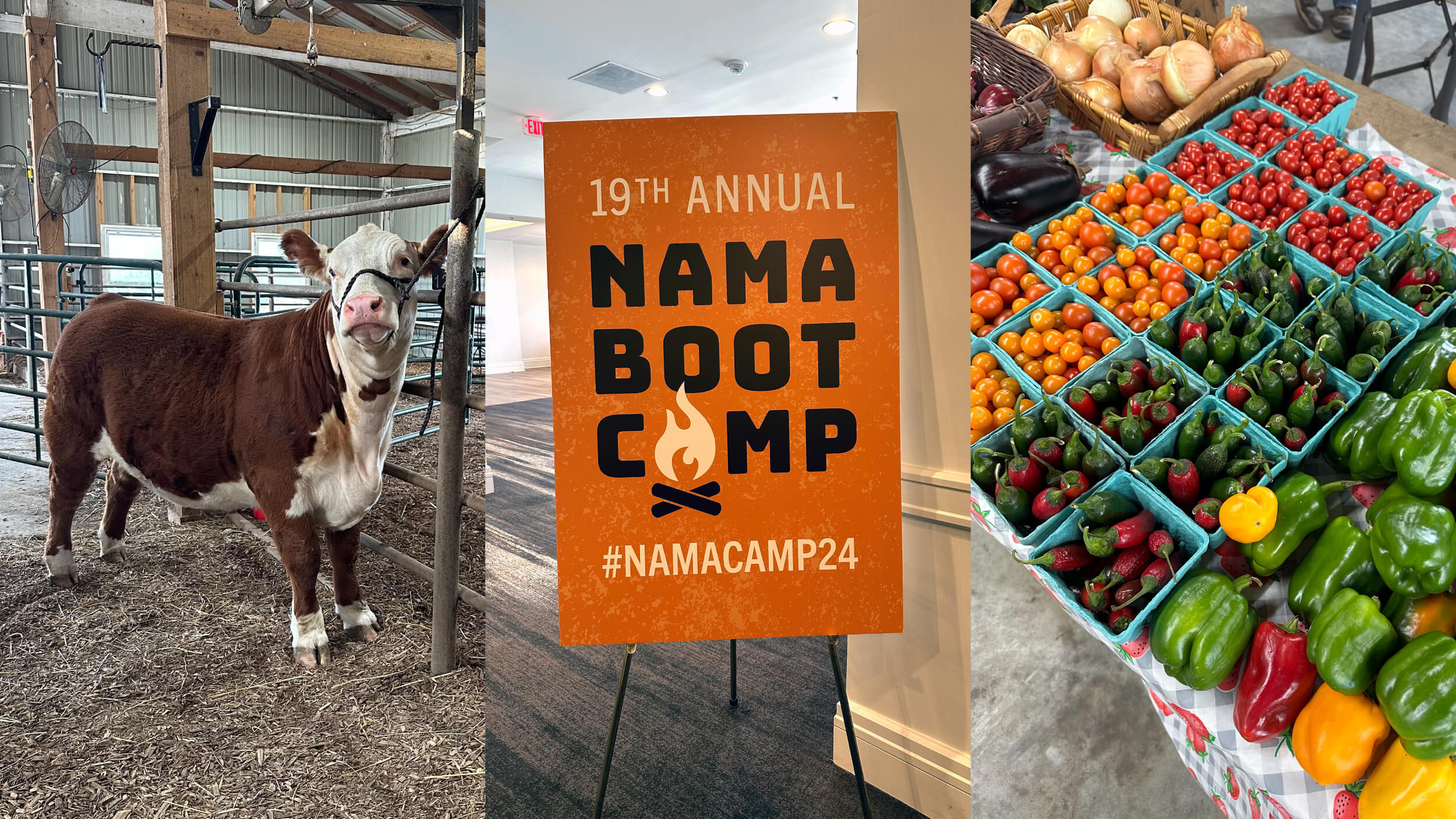Maren Viker | Brand Strategist
This summer, I walked into NAMA Boot Camp thinking I had a pretty good understanding of what it was like to work in agriculture — after all, I have family agriculture history and had been working with ag clients for over a year. But I left Boot Camp with a new appreciation for the complexities of farming, marketing and relationships that drive this industry. Here are four things that I’m still thinking about.
📈 Diversification on the farm is more than just trying out a new crop.
As the number of family farms dwindles, farmers are trying all kinds of new things to ensure their operations can continue to support them. One farmer we spoke to pivoted his entire business model to an agri-tourism destination. What once was a row crop operation is now full of flower gardens for photo ops, patches for families to pick their own berries, watermelons and pumpkins, plus corn pits, zip lines and loose chickens to entertain the kindergarten class field trips that come through. He continues to have his most profitable seasons yet, year after year.
While some farmers shift their entire operation into agritourism, others, like a ranch owner we met, diversify in a different way — by encouraging family members to develop outside skills (like auctioneering or ag communications). This not only lightens the burden on the farm but ensures the next generation can stay involved without straining resources.
🧑🧑🧒🧒 Decision making on a family farm is far from predictable.
As a strategist, I dream of a chart that will tell me which family member has final say on each purchase of an operation. No such chart exists because no two families are the same. Several times during our Boot Camp sessions, we heard how complicated the dynamics are of having a mother, father, daughters, sons, uncles and cousins, all in the decision-making process.
Confusion is often compounded when there isn’t detailed estate planning. People don’t have a clear understanding of who will be responsible for what down the line, which can paralyze decision making. Once stakeholders have that clarity, they’re off to the races futureproofing their operation, because they know one day the legacy of the farm will be their responsibility.
🌎 The status between farmers and the world they feed — it’s complicated.
One frequent comment we heard from the operation owners and managers was that they are struggling under the weight of consumer perception. As more urban dwellers move into rural areas, some farmers commented on expectations and assumptions non-farmers had of them.
In one example, a new neighbor asked a well-established ranch to move where their horses are kept, because he was allergic. In another, new neighbors camped out alongside a farmer’s fields, watching him apply herbicides, waiting to see if he “slipped up”. While the interactions range from comical to serious, these encounters represent a shift in consumer attention towards how food is grown, and the environmental impacts of long-held practices. None of the farmers dismiss the concerns outright, some even switched up the products that they used to meet concerns of neighbors, but it’s hard when you feel your way of life is misunderstood.
The farmers we spoke to loved what they do. But the story that often gets told doesn’t reflect the care they take for their land and community. A big reason the farmers agreed to speak with the Boot Camp groups, it seemed, was because they wanted the messengers (marketers) to understand the perspectives of the people we’re talking to and about. Consumer pressure on major industries is an important part of keeping business accountable. But it’s also our job as marketers to make sure that people are getting the full story, and we’re helping farmers feel seen.
🤝 If you can avoid kitsch, emotional appeals are effective in ag.
When I first heard presenters talk about the value of emotional appeals in agriculture, I was a little skeptical. But after chatting with some farmers and equipment specialists, it started to make more sense. The “emotional appeal” they talked about wasn’t about pulling heartstrings with kitschy ads or pandering to a generic sentiment. It was about something much more practical: trust. Farmers rely on their ag equipment dealer, their seed supplier, or their agronomist to keep their business running smoothly. There’s an emotional element in believing that your dealer has your back and truly wants your farm to succeed. It’s about confidence in the relationship, knowing they’ll be there when things go wrong or when you need advice.
Connections between people — whether it’s farmer and dealer, or supplier and client — are inherently emotional. If you can remind customers of those connections, you’re making an emotional appeal that resonates. Business partners who invest in building that trust and service relationship are going to go further. It’s about consistently showing up, being reliable, and creating a partnership that farmers know they can count on. When done right, these emotional appeals don’t feel like “advertising” at all — they feel like community, and that’s what builds lasting loyalty in agriculture.
